Nº 19 - Año 2006
TÍTULO:
El "antimaketismo": la visión de Sabino Arana sobre España y los españoles.
AUTOR:
José Luis DE LA GRANJA SAINZ
PÁGINAS:
191 - 203
PALABRAS CLAVE:
Sabino Arana, nacionalismo vasco, Euskadi, España, antiespañolismo.
RESUMEN
El nacionalismo vasco surgió en Bilbao en el último decenio del siglo XIX por obra de Sabino Arana (1865-1903), su máximo ideólogo y fundador del PNV en 1895. Uno de los rasgos básicos de su doctrina política fue el antiespañolismo, que implicaba el rechazo absoluto de España como nación extranjera y la ruptura total con el Estado liberal español. Su manifestación más virulenta fue el antimaketismo o xenofobia contra los españoles emigrantes en el Bilbao de la revolución industrial. A ello contribuyó su concepción esencialista de Euskadi como nación sustentada en la raza vasca y la religión católica. Aunque Arana mitigó su antiespañolismo desde 1898 e incluso preconizó un regionalismo autonomista en el último año de su vida, su denominada evolución españolista murió con él en 1903. El PNV mantuvo inmutable durante décadas el legado aranista, en el cual era fundamental el antiespañolismo, el antagonismo maniqueo Euskadi/España, constante seña de identidad del movimiento nacionalista vasco a lo largo de su historia.
ABSTRACT
The Basque Nationalist movement, created by Sabino Arana (1865-1903), appeared in Bilbao in the last decade of the XIX century. Arana was its greatest ideologue and the founder of the Basque Nationalist Party. One of the main characteristics of its political doctrine was anti-Spanishness, which meant the absolute rejection of Spain, considering it to be a foreign nation, and the total break with the liberal Spanish State. lts main virulent point of view was its antimaketismo or xenophobia against the Spanish immigrants during the industrial revolution in the city of Bilbao. This came from Arana's fundamentalist conception of Euslwdi (the name of the Basque Country in the Basque language) based on the Basque race and the Catholic Religion. Arana reduced his anti-Spanish position in 1898 and during the last year of his life he even advocated an autonomous regionalism, but his so-called Spanish evolution died with him in 1903. For decades, the Basque Nationalist Party maintained Sabino Arana's doctrine, a fundamental part of which was the anti-Spanishness, the Manichean antagonism Euskadi-Spain, which provided a permanent identity for the Basque Nationalist Movement throughout its history.
-
Nº 27/28 - Años 2014/2015

-
Nº 25/26 - Años 2012/2013

-
Nº 24 - Año 2011

-
Nº 23 - Año 2010

-
Nº 22 - Año 2009

-
Nº 21 - Año 2008

-
Nº 20 - Año 2007

-
Nº 19 - Año 2006

-
Nº 18 - Año 2005

-
Nº 17 - Año 2004

-
Nº 16 (Vol. 1) - Años 1996/2003

-
Nº 16 (Vol. 2) - Años 1996/2003

-
Nº 15 - Año 1995
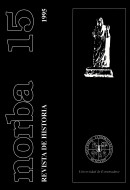
-
Nº 14 - Año 1994
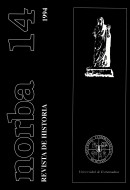
-
Nº 13 - Año 1993
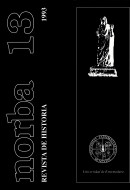
-
Nº 11/12 - Años 1991/1992
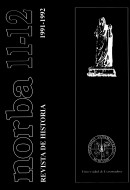
-
Nº 10 - Años 1989/1990
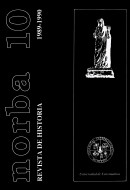
-
Nº 8/9 - Años 1987/1988
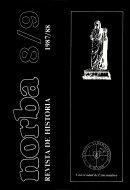
-
Nº 7 - Año 1986
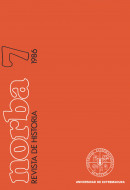
-
Nº 6 - Año 1985
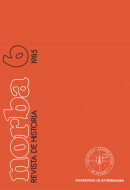
-
Nº 5 - Año 1984
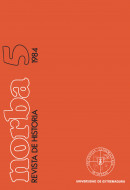
Arriba

 Identifícate
Identifícate
 DESCARGAR PDF
DESCARGAR PDF



 Mapa Web
Mapa Web Contador de Visitas:
Contador de Visitas:
 Dónde Estamos
Dónde Estamos


